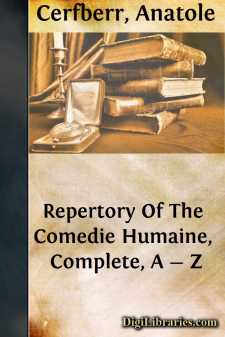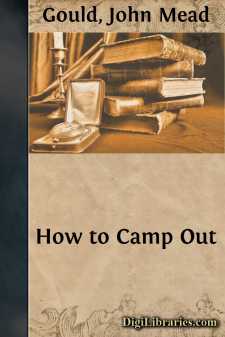Non-Classifiable
- Non-Classifiable 1768
Non-Classifiable Books
Sort by:
OF THE LEGENDARY PAST "LITTLE WARS" is the game of kings—for players in an inferior social position. It can be played by boys of every age from twelve to one hundred and fifty—and even later if the limbs remain sufficiently supple—by girls of the better sort, and by a few rare and gifted women. This is to be a full History of Little Wars from its recorded and authenticated beginning until...
more...
The parsons names are Cannius and Poliphemus. Annius. what hunt Polipheme for here? Poliphem. Aske ye what I hunt for here, and yet ye se me haue neyther dogges, dart, Jauelyn, nor huntyng staffe. Cannius. Paraduenture ye hunt after some praty nymphe of the couert. Poliphemus. By my trouth and well coniectured, be holde what a goodly pursenet, or a hay I haue here in my hande. Canni. Benedicite, what a...
more...
by:
Anatole Cerfberr
INTRODUCTION Are you a confirmed Balzacian?—to employ a former expression of Gautier in Jeune France on the morrow following the appearance of that mystic Rabelaisian epic, The Magic Skin. Have you experienced, while reading at school or clandestinely some stray volume of the Comedie Humaine, a sort of exaltation such as no other book had aroused hitherto, and few have caused since? Have you dreamed...
more...
by:
David J. Deane
CHAPTER I. PIONEER MISSIONS IN SOUTH AFRICA. The history of missions in South Africa abounds in interesting facts and incidents. Stories of heroism, strange adventures, and descriptions of journeyings among savage tribes and through countries frequented by beasts of prey, form part of its details. Its theme is love to God and love to man, and its facts have been called into existence through the...
more...
by:
Richard Wagner
PART I 1813-1842 I was born at Leipzig on the 22nd of May 1813, in a room on the second floor of the 'Red and White Lion,' and two days later was baptized at St. Thomas's Church, and christened Wilhelm Richard. My father, Friedrich Wagner, was at the time of my birth a clerk in the police service at Leipzig, and hoped to get the post of Chief Constable in that town, but he died in the...
more...
Lincoln's Last Hours One of the most cruel wars in the history of the world had nearly closed. The people of the United States were rejoicing at the prospect of peace and returning happiness. President Lincoln, after the surrender of General Robert E. Lee, visited Richmond, Virginia, exposing himself to great danger, and on his return delivered an address from the balcony of the White House. I was...
more...
by:
Charles Mackay
Every age has its peculiar folly—some scheme, project, or phantasy into which it plunges, spurred on either by the love of gain, the necessity of excitement, or the mere force of imitation. Failing in these, it has some madness, to which it is goaded by political or religious causes, or both combined. Every one of these causes influenced the Crusades, and conspired to render them the most...
more...
by:
Ernest Weekley
CHAPTER I OF SURNAMES IN GENERAL "The French and we termed them Surnames, not because they are the names of the Sire, or the father,but because they are super-added to Christian names." (CAMDEN, Remains concerning Britain.) The study of the origin of family names is at the same time quite simple and very difficult. Its simplicity consists in the fact that surnames can only come into existence...
more...
by:
John Mead Gould
CHAPTER I. GETTING READY. The hope of camping out that comes over one in early spring, the laying of plans and arranging of details, is, I sometimes think, even more enjoyable than reality itself. As there is pleasure in this, let me advise you to give a practical turn to your anticipations. Think over and decide whether you will walk, go horseback, sail, camp out in one place, or what you will do;...
more...
Bishop Hay strongly impressed upon Mackenzie the propriety of getting his marriage with Agnes of Lovat legitimized, and to send for a commission to the Pope for that purpose. Donald Dubh MacChreggir, priest of Kirkhill, was despatched to Rome with that object, and, according to several of the family manuscripts, procured the legitimation of the marriage. "This priest was a native of Kintail,...
more...











